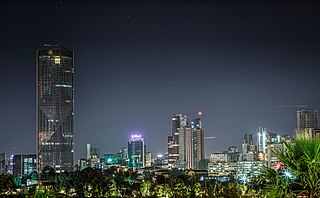
Addis Ababa is the capital and largest city of Ethiopia. In the 2007 census, the city's population was estimated to be 2,739,551 inhabitants. Addis Ababa is a highly developed and important cultural, artistic, financial and administrative centre of Ethiopia.

Addis Ababa University (AAU) is a national university located in Addis Ababa, Ethiopia. It is the oldest university in Ethiopia. AAU has thirteen campuses. Twelve of these are situated in Addis Ababa, and one is located in Bishoftu, about 45 kilometres (28 mi) away. AAU has several associated research institutions including the Institute of Ethiopian Studies. The Ministry of Education admits qualified students to AAU based on their score on the Ethiopian University Entrance Examination (EUEE).
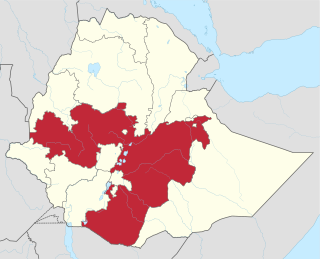
Oromia is a regional state in Ethiopia and the homeland of the Oromo people. Under Article 49 of Ethiopian Constitution, the capital of Oromia is Addis Ababa, also called Finfinne. The provision of the article maintains special interest of Oromia by utilizing social services and natural resources of Addis Ababa.

Ethiopia is a federation subdivided into ethno-linguistically based regional states and chartered cities. This system of administrative regions replaced the provinces of Ethiopia in 1992.

Tsegaye Gabre-Medhin was an Ethiopian poet and novelist. His novels and poems evoke retrospective narratives, fanciful epics, and nationalistic connotations. Gabre-Medhin is considered to be one of the most important Ethiopian novelists, along with Baalu Girma and Haddis Alemayehu. His books have been successful in commercial sales and in even academic theses. His works are solely based in Amharic and English.
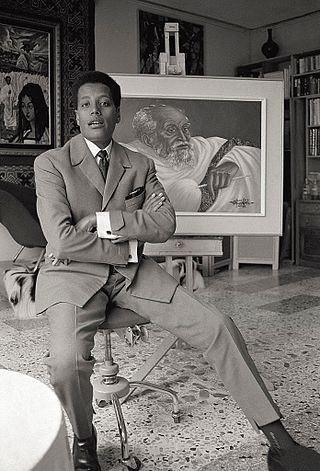
Afewerk Tekle was an Ethiopian artist, particularly known for his paintings on African and Christian themes as well as his stained glass.

Haddis Alemayehu was an Ethiopian novelist and Foreign Minister of Ethiopia. His Amharic novel Love to the Grave is considered a classic of modern Ethiopian literature.

The Welayta, Wolayta or Wolaytto are an ethnic group and its former kingdom, located in southern Ethiopia. According to the most recent estimate (2017), the people of Wolayta numbered 5.83 million in Welayta Zone. The language of the Wolayta people, similarly called Wolaytta, belongs to the Omotic branch of the Afro-Asiatic language family. Despite their small population, Wolayta people have widely influenced national music, dance and cuisine in Ethiopia.

Alemayehu Eshete Andarge was an Ethiopian singer. He had performed since the 1960s and primarily in Amharic. He had been nicknamed "the Ethiopian Elvis".
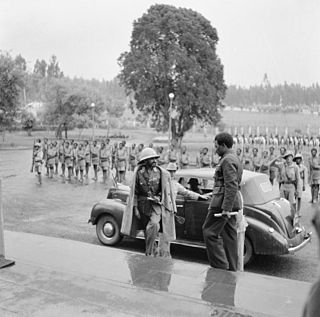
The history of Addis Ababa, capital of Ethiopia, formally begins with the founding of the city in the 19th century by Ethiopian Emperor Menelik II and his wife Empress Taytu Betul. In its first years the city was more like a military encampment than a town. The central focus was the emperor’s palace, which was surrounded by the dwellings of his troops and of his innumerable retainers. In the 1920s, Addis Ababa experienced a significant economic upturn, marked by a surge in the number of middle-class-owned buildings, including stone houses furnished with imported European furniture. The middle class also introduced newly manufactured automobiles and expanded banking institutions. Urbanization and modernization persisted during the Italian occupation, guided by a masterplan aimed at transforming Addis Ababa into a more "colonial" city, a trajectory that continued beyond the occupation. Subsequent master plans, formulated from the 1940s onward with the input of European consultants, focused on the development of monuments, civic structures, satellite cities, and the inner city.

The Harari people are a Semitic-speaking ethnic group which inhabits the Horn of Africa. Members of this ethnic group traditionally reside in the walled city of Harar, simply called Gēy "the City" in Harari, situated in the Harari Region of eastern Ethiopia. They speak the Harari language, a member of the South Ethiopic grouping within the Semitic subfamily of the Afroasiatic languages.
Captain Alemayehu Haile was a member of the Derg, the military junta that ruled Ethiopia from 1974 to 1987.
Alemayehu Fentaw Weldemariam is an Ethiopian constitutional law scholar, political theorist, conflict analyst, and a public intellectual.
Gebrehiwot Baykedagn (1886–1919) was an Ethiopian doctor, economist, and intellectual. He was born in 1886 in Adwa, Tigray. In a trip to the port of Massawa, Gebrehiwot and his friends got permission from the captain of a German ship to visit the ship. On departure, he stowed away. On arrival, the captain entrusted the young boy to a rich Austrian family, who adopted him. This good fortune opened to him the opportunity to study the German language and to go to school. His exposure to Western education was thorough, and he pursued medical studies at Berlin University. He returned to his country and became private secretary and interpreter to the Emperor Menelik II, who defeated the Italian colonial army in 1896 at the Battle of Adwa. Later on, while the Haile Selassie was still the successor to the throne, he fulfilled important administrative functions. He served as inspector of the important Addis Ababa-Djibouti railway until his premature death in 1919.
The following is a historical events of Addis Ababa, the capital of Ethiopia, including its formation prior to 20th century by chronology.
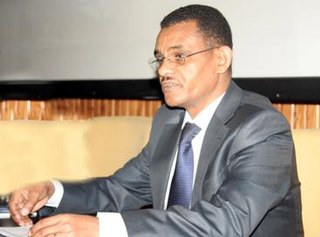
Alemayehu Atomsa was an Ethiopian politician who served as the president of the Oromia Region, the largest of the country's regions, from 2010 until his resignation due to illness in 2014, from which he died in Bangkok, Thailand, on 6 March 2014.
Aida Edemariam is an Ethiopian-Canadian journalist based in the UK, who has worked in New York, Toronto and London. She was formerly deputy review and books editor of the Canadian National Post, and is now a senior feature writer and editor at The Guardian in the UK. She lives in Oxford. Her memoir about her Ethiopian grandmother, The Wife's Tale: A Personal History, won the Ondaatje Prize in 2019.
Daniachew Worku was an Ethiopian writer whose works include novels, plays and short stories. He wrote in both Amharic and English.
Assefa Gebre-Mariam Tessema is an Ethiopian poet and academic. He wrote the national anthem of Ethiopia from 1975 to 1992, Ethiopia, Ethiopia, Ethiopia be first. As of 2016, he was working as a teacher in Kaffa Province.











